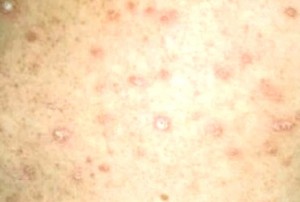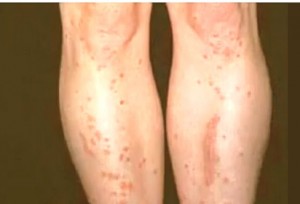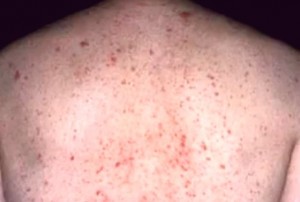What is Guttate Psoriasis ?
Guttate Psoriasis is a form of psoriasis that seems like tiny salmon pinkish droplets on the skin. Latin word ‘gutta’ which means ‘drop’ has been used for Guttate psoriasis. It is not infectious but can be hereditary. It is found mostly in arms, trunk and legs. Also it could occur over a larger part of the body. It is caused due to streptococcal bacteria. After a person is infected by strep throat rash then within two to three weeks guttate psoriasis occurs. Guttate psoriasis affects both girls and boys and usually affects the children and those who are less than thirty years.
Guttate Psoriasis symptoms
Some of the symptoms of guttate psoriasis are as follows:
- Lesions like ‘drops’ which are itchy
- Tiny pinkish or reddish droplets appears on the skin within two to three weeks soon after strep throat rash or tonsillitis
- It starts from the trunk, legs or arms and then moves further to face, scalp or ears. Mostly the bottom of the feet and palms remains unaffected.
- There is change in nails for example pits and ridges, which are signs of severe psoriasis, could be absent
Causes of Guttate Psoriasis
The causes of Guttate Psoriasis include:
- Infection of Streptococcal bacteria: Around eighty per cent of the people are suffering from guttate psoriasis due to the streptococcal bacteria infections. It is in tonsillopharyngitis form before it breaks out. This outbreak is due to the immune reactions by the streptococcal bacteria. This immune system produces white blood cells which provide protection to the body from infections. When a person has psoriasis the ‘T’ cells which are types of white blood cells, unusually start off inflammation in skin and produces excess skin cells.
- Family history of Guttate psoriasis
- Excess of human leukocyte antigen B13: Those suffering from guttate psoriasis have high human leukocyte antigens. Antigens are materials foreign to the body. The immune system knows these antigens and produces antibodies to do away with the bacteria and viruses and these foreign materials. But when a person has high antigens it is unable to produce antibodies resulting in guttate psoriasis.
- Viral infections like rubella, chicken pox, roseola etc. can start off outbreak of guttate psoriasis in kids.
Test and Diagnosis
To diagnose guttate psoriasis a thorough examination of the skin by a medical professional (skin specialist) has to be done. The specialist can identify whether the person has guttate psoriasis.
Sometimes biopsy of skin is also done to know whether it is guttate psoriasis.
Blood test also helps to know whether the person had been infected from streptococcal bacteria.
Guttate Psoriasis treatment
There are many ways guttate psoriasis can be treated. Some are as follows:
- When guttate psoriasis is not very serious, one can treat it at home. One has to keep the skin moist. This will help in preventing itchy feeling. Therefore good moisturizer should be used to keep the skin moist and soft.
- Topical steroids can also be used; this helps in reducing inflammation and itchy feeling.
- If it is hereditary, then the dermatologist will go for throat culture if the patient has sore throat and if the tests show that the patient has been infected by streptococcal bacteria then the doctor will advise to take antibiotics to fight the infections. Some of the antibiotics are:
- Erythromycin: This drug helps in reducing inflammation and treats infection caused by bacteria. Usually it is take 1/day by mouth for around one to two weeks. Those who have allergies to this drug or have liver problem should avoid this drug. One should not continue taking erythromycin if the patient feels nauseated, vomiting or gets fever.
- Penicillin: Like erythromycin penicillin has to be taken 1/day by mouth for around two weeks.
- Rifampin: To resist streptococcal bacterial infections rifampin is taken along with penicillin or erythromycin and the course is for five days.
- There is a therapy called phototherapy. In this the ultraviolet light in daylight helps in reducing the guttate psoriasis symptom in few patients. The medical expert could advice short course of phototherapy (also called as artificial light therapy). In this Narrowband or broadband ultraviolet B lights can be used.
- There is another therapy called PUVA therapy. In this therapy psoralen drugs is combined with exposure to ultraviolet A light which is beneficial in serious guttate psoriasis. This drug makes the skin susceptible to the sun and has to be taken some hours previous to the light therapy. In PUVA therapy precaution has to be taken so as to prevent twenty four hours exposure of skin to the sun. In PUVA therapy there is side effect as well like the person undergoing this therapy may feel like vomiting or nauseated. These are controlled by intake of psoralen drugs after the meals. The patient has to wear special sunglasses and exposure to sun should be avoided throughout the PUVA therapy.
Guttate Psoriasis pictures



Great write-up, I抦 normal visitor of one抯 website, maintain up the excellent operate, and It’s going to be a regular visitor for a lengthy time.